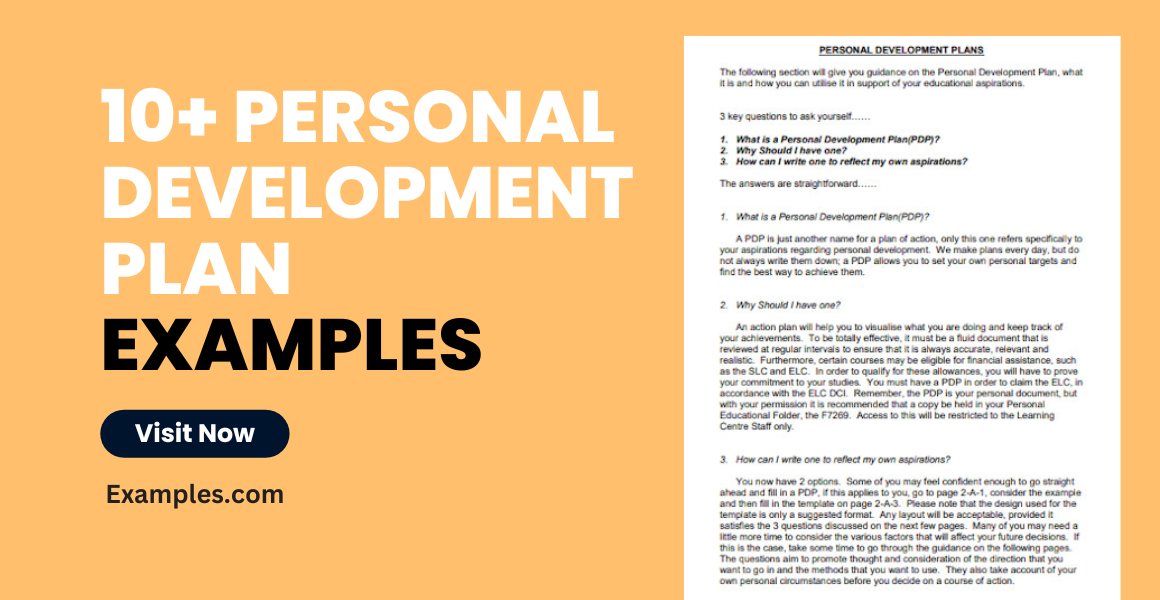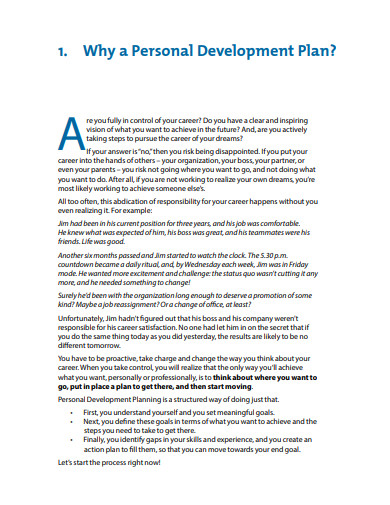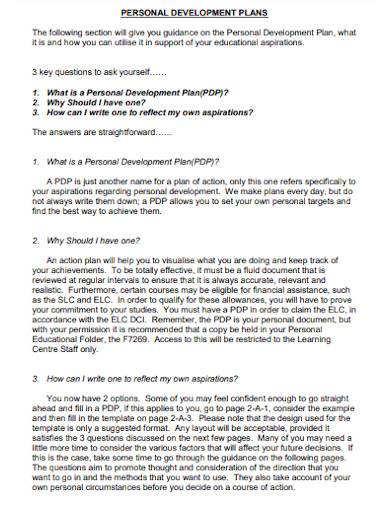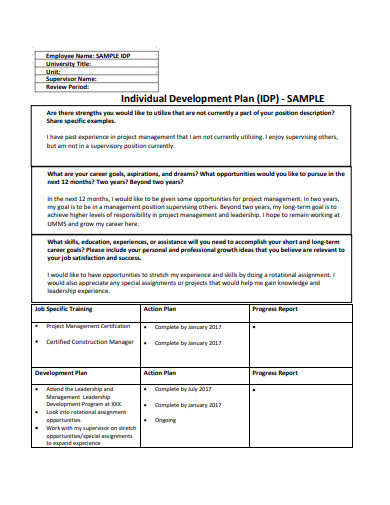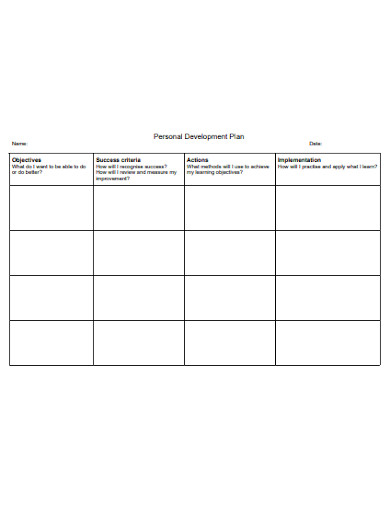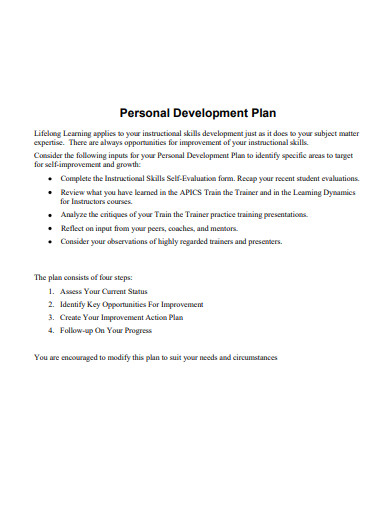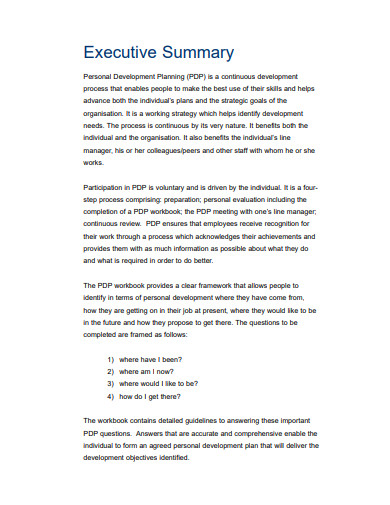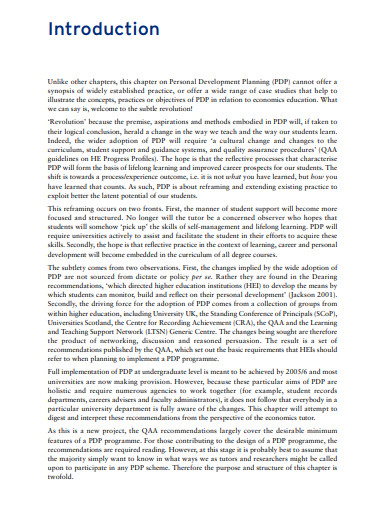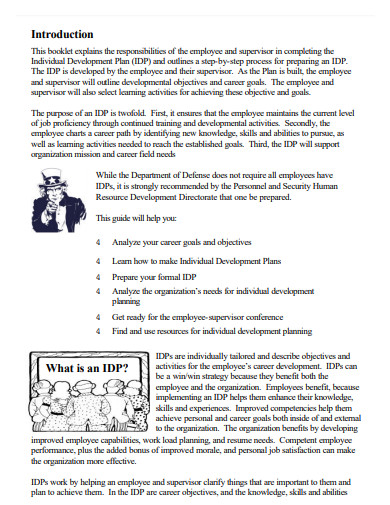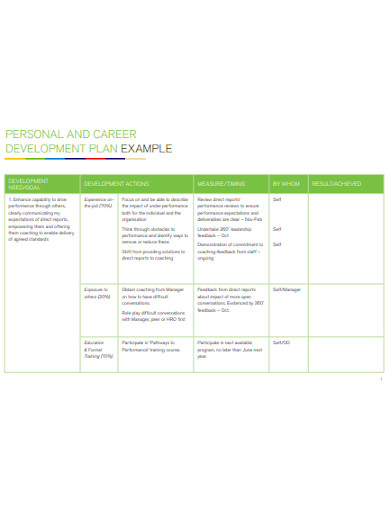10+ Personal Development Plan Examples to Download
Individuals, professional employees or students, want to achieve their respective definitions of a successful life. In order for them to do so, they have to come up with self-development plans. The process document acts as a project manager that organizes the action plans of a certain self-growth plan. In addition, it comes in many varieties, like a personal education plan and career development plan. It also provides a SWOT analysis in the work and leadership aspects. If you are looking for examples of personal development plans, then our list of sample templates perfectly suits your needs! Whether you are searching about leadership, accounting, assignment, and strengths, in particular, it got them all covered! Check them out below!
10+ Personal Development Plan Examples
1. Personal Development Plan
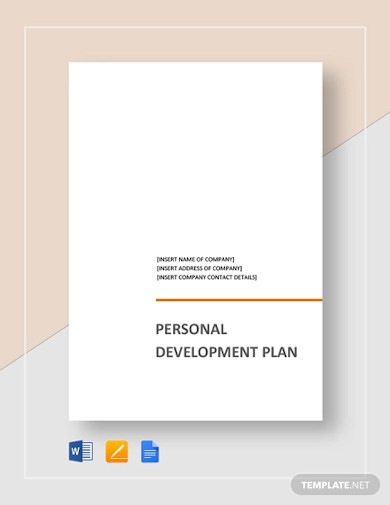
2. Personal Development Plan Mind Map
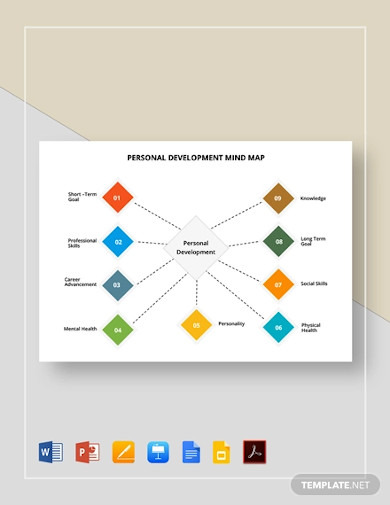
3. Personal Development Plan for Work
What do you write in a personal development plan?
Introduction to Personal Development Plan
A personal development plan (PDP) is a structured framework that outlines goals and strategies for improving personal skills, competencies, and overall development. It serves as a roadmap for personal growth and professional advancement.
Self-Assessment
Begin your PDP with a self-assessment. Reflect on your strengths, weaknesses, skills, values, and what you are passionate about. This will help you identify areas for growth and set relevant goals.
Defining Clear Goals
Set specific, measurable, achievable, relevant, and time-bound (SMART) goals. These should align with your long-term aspirations and be broken down into short-term objectives.
Action Plan
For each goal, develop an action plan detailing the steps required to achieve it. Include resources you will need, such as training, books, or mentorship, and set deadlines for each action.
Skills Development
Identify the skills you need to develop or improve to achieve your goals. This could include professional qualifications, soft skills like communication, or technical abilities relevant to your field.
Opportunities for Growth
Look for opportunities that align with your goals, such as projects, courses, or networking events. This section should outline how you plan to seize these opportunities.
Monitoring Progress
Establish a system for regularly reviewing and monitoring your progress towards your goals. Decide how often you will evaluate your plan and adjust it as necessary.
Reflection
Include a section for reflecting on what you learn as you work through your PDP. Reflective practice can help you understand your experiences and how they contribute to your personal development.
Support Network
Outline the support network you have or need, such as mentors, coaches, or peers. Describe how they will support you in your personal development journey.
Conclusion and Next Steps
Conclude your plan by summarizing your overall objectives and the next steps you will take. This should be a motivational closing that reaffirms your commitment to your personal development.
A personal development plan is a living document that should evolve as you grow and achieve your goals. Regularly updating your PDP is crucial to ensure it remains relevant and aligned with your aspirations.
4. Personal Development Plan Example
5. Sample Individual Development Plan
6. Personal Development Plan for Accounting
How to Develop a Personal Development Plan?
Introduction to Personal Development Planning:
Developing a personal development plan (PDP) is a strategic approach to enhancing your skills and advancing your career or personal growth. It involves self-reflection, goal setting, and creating a structured path for improvement.
Self-Assessment:
Start with a thorough self-assessment to identify your strengths, weaknesses, interests, values, and any areas you wish to develop. Tools like SWOT analysis (Strengths, Weaknesses, Opportunities, Threats) can be helpful in this stage.
Setting Personal and Professional Goals:
Define clear, specific goals that you want to achieve. Use the SMART criteria to ensure your goals are Specific, Measurable, Achievable, Relevant, and Time-bound. Break down larger goals into smaller, actionable steps.
Creating an Action Plan:
For each goal, create an action plan that outlines the steps needed to achieve it. This should include:
- Specific actions: What will you do to reach your goal?
- Resources needed: Identify any resources or support you’ll need, such as books, courses, or mentors.
- Timeline: Set a realistic timeline for each action step.
Identifying Skills and Competencies:
Determine the skills and competencies you need to develop to achieve your goals. This could include technical skills, leadership abilities, or soft skills like communication or time management.
Seeking Opportunities for Growth:
Look for opportunities that can help you achieve your goals, such as volunteering, internships, networking events, or additional responsibilities at work.
Monitoring and Reviewing Progress:
Decide how you will track your progress. This could be through regular self-evaluations, feedback from others, or setting up milestones. Schedule periodic reviews of your PDP to assess your progress and make adjustments as needed.
Reflecting on Achievements and Setbacks:
Reflect on your experiences, both positive and negative. Consider what you’ve learned from each and how you can apply that knowledge moving forward.
Adjusting the Plan:
Be prepared to adjust your plan as you progress or as your goals and circumstances change. Flexibility is key to a successful personal development plan.
Conclusion and Commitment:
End your plan with a commitment to yourself. Acknowledge the effort and dedication it will take and reaffirm your commitment to personal growth and development.
A personal development plan is a dynamic tool that guides your growth journey. It requires commitment, regular review, and adaptation to ensure it remains aligned with your evolving aspirations and life circumstances.
7. Leadership Personal Development Plan
8. Basic Personal Development Plan
9. Formal Personal Development Plan
What are some Good Personal Development Goals?
Enhancing Professional Skills
Setting goals to improve professional competencies can lead to career advancement and job satisfaction. This might include mastering a new software, learning a second language, or gaining a professional certification.
Improving Communication Skills
Effective communication is crucial in both personal and professional settings. Goals could involve public speaking, active listening, or writing skills. Joining a debate club or taking communication workshops can be part of this goal.
Building Leadership Abilities
Whether you’re leading a team or just want to be more influential, developing leadership skills is a valuable goal. This could involve mentorship, leadership courses, or taking on leadership roles in community organizations.
Expanding Knowledge
Committing to lifelong learning and staying current with industry trends can be a goal. This might involve subscribing to relevant journals, enrolling in online courses, or attending webinars and conferences.
Enhancing Time Management
Improving time management can increase productivity and reduce stress. Goals might include learning to prioritize tasks, use time management tools, or adopt techniques like the Pomodoro Technique.
Developing Emotional Intelligence
Emotional intelligence is key for building relationships and navigating social complexities. Goals may include improving empathy, self-regulation, and motivation.
Cultivating a Healthy Lifestyle
Physical health impacts all areas of life. Goals might include regular exercise, a balanced diet, or practicing mindfulness and meditation.
Building Financial Stability
Financial goals can provide security and peace of mind. This could involve creating a budget, saving a certain amount of money, or investing in education about financial markets.
Fostering Creativity
Creativity is not just for artists; it’s a valuable skill in problem-solving and innovation. Goals could include daily creative exercises, learning a new craft, or engaging in creative thinking workshops.
Networking and Relationship Building
Expanding your professional network can open doors to new opportunities. Goals might involve attending networking events, joining professional associations, or simply reaching out to colleagues and industry peers.
Achieving Work-Life Balance
Finding a balance between career and personal life is crucial for overall well-being. Setting boundaries, learning to say no, and prioritizing personal time can be part of this goal.
Pursuing a Passion Project
Working on a project that you’re passionate about can be incredibly fulfilling. Whether it’s writing a book, starting a blog, or volunteering, make it a goal to dedicate time to this pursuit.
Improving Adaptability and Flexibility
The ability to adapt to change is a valuable skill. Goals might include learning to cope with change, being open to new ideas, or developing problem-solving skills.
Enhancing Self-Confidence
Building self-confidence can affect every aspect of your life. Goals could involve speaking up more in meetings, joining a new social group, or taking on challenges that push you out of your comfort zone.
Practicing Mindfulness and Self-Care
Mindfulness can improve mental health and reduce stress. Goals might include daily meditation, journaling, or other self-care practices that promote mental well-being.
Setting personal development goals is a deeply personal process and should reflect your values, interests, and desired path in life. These goals should challenge you while also being attainable with effort and commitment.
10. Employee Individual Development Plan
11. Printable Personal Development Plan
What Is a Personal Development Plan?
A personal development plan is a program that focuses on improving the document owner’s attributes. The personal development goals that come with it may include the acquiring of skills, knowledge, and experiences in a specific professional field. In her blog, Erin Gobler wrote that an individual development plan gives a person a purpose-driven life that heads towards a happy and more convenient way of living. Through the years, people have been taking this kind of plan more and more seriously. In fact, Market Research Blog revealed that from USD 9.9 billion market worth in 2016, the self-improvement industry in the United States expects to reach USD 13.2 billion by 2022.
What are the benefits of a Personal Development Plan?
Here are the benefits of a Personal Development Plan:
Clarified Personal and Professional Objectives
A personal development plan helps in setting clear and structured goals, aligning them with personal aspirations and career ambitions. This clarity of purpose can drive motivation and focus.
Enhanced Self-Awareness
Creating a plan requires introspection, leading to greater self-awareness. Understanding strengths, weaknesses, and areas for improvement is crucial for personal growth.
Improved Skill Set
A PDP often includes goals for skill enhancement, leading to professional development and increased competency in various areas, which can open up new opportunities.
Better Decision-Making
With a clear understanding of personal goals and values, individuals can make more informed decisions that align with their long-term objectives.
Increased Motivation and Commitment
Setting personal goals and outlining steps to achieve them can boost motivation and commitment, as the plan acts as a roadmap to success.
Enhanced Performance and Productivity
A PDP can lead to improved performance and productivity by encouraging a more focused and efficient approach to tasks and responsibilities.
Greater Resilience
By continuously learning and adapting through a PDP, individuals can build resilience, better preparing them to handle change and setbacks.
More Effective Time Management
A PDP encourages setting timelines and deadlines, which can improve time management skills and lead to more efficient use of time.
Career Advancement
A well-executed PDP can lead to career advancement as it demonstrates initiative and dedication to self-improvement, qualities valued by employers.
Personal Satisfaction and Fulfillment
Achieving personal development goals can lead to a sense of accomplishment and personal fulfillment, enhancing overall life satisfaction.
Better Work-Life Balance
A PDP can include goals for achieving a better work-life balance, leading to reduced stress and improved overall well-being.
Enhanced Professional Reputation
Continuous personal development can enhance one’s reputation in the professional community, leading to recognition as a committed and forward-thinking individual.
Networking Opportunities
A PDP may involve attending workshops, courses, and networking events, leading to new professional relationships and opportunities.
Financial Benefits
Improving skills and competencies can lead to financial benefits, such as promotions, raises, or the ability to pursue new income streams.
A personal development plan is a strategic plan tool that benefits an individual in multifaceted ways, contributing to both personal satisfaction and professional success.
How to write Personal Development Goals?
Introduction to Personal Development Goals
Writing personal development goals involves a thoughtful process where you identify areas for growth that align with your values, aspirations, and career objectives. These goals should be designed to propel you towards a more fulfilling personal and professional life.
Self-Reflection and Evaluation
Begin by taking stock of your current situation. Reflect on your skills, experiences, and what aspects of your life you wish to improve. Consider feedback you’ve received and areas where you feel challenged or motivated to grow.
Identifying Areas for Growth
Pinpoint specific areas where you want to see change. This could be professional skills, personal traits, health and wellness, or knowledge and education. Be honest with yourself about what you need to work on to move forward.
Setting SMART Goals
Ensure your goals are Specific, Measurable, Achievable, Relevant, and Time-bound (SMART). This framework helps to create clear and actionable objectives.
- Specific: Define what you want to accomplish with as much detail as possible.
- Measurable: Determine how you will measure progress and success.
- Achievable: Make sure the goal is within your capabilities and resources.
- Relevant: Align your goals with your overall life plans and values.
- Time-bound: Set a realistic deadline for completion.
Creating an Action Plan
For each goal, develop a step-by-step action plan. This should include:
- Action Steps: Break down the goal into smaller tasks that lead to the final objective.
- Resources Needed: Identify what resources, support, or skills you will need.
- Timeline: Assign a timeline to each action step to keep you on track.
Prioritizing Your Goals
If you have multiple goals, prioritize them. Decide which goals are the most urgent or important and tackle those first. This helps to manage your focus and resources effectively.
Visualizing Success
Visualize what achieving your goals will look like. This can be a powerful motivator and can help clarify what success means to you.
Monitoring and Adjusting Your Goals
Set up a system to regularly review your goals. This allows you to track your progress and make adjustments as needed. Life circumstances can change, and your goals may need to evolve as well.
Seeking Feedback
Don’t hesitate to ask for feedback from trusted friends, mentors, or colleagues. They can provide valuable insights and help you refine your goals.
Committing to Your Goals
Write a commitment statement for each goal. This is a personal promise to yourself that you will strive to achieve the goal, reinforcing your dedication.
Review and Reflect
Regularly review your goals and reflect on your progress. Celebrate the milestones you achieve and learn from the setbacks. Use these reflections to inform future goal-setting.
Writing personal development goals is a dynamic process that requires introspection, planning, and commitment. By setting clear, well-thought-out goals, you create a path for personal growth and professional development.
Motivational Speakers
The self-improvement industry is composed of nine sectors. One of these is motivational speakers. The sector consists of professionals that hold an expertise on a particular subject. Their main purpose is to inspire people by sharing to them their personal experiences and enlightenment. When it comes to incomes, motivational speakers earn by speaking on events. The more gigs they have, their reputation increases. The higher their reputations become, the more company event invitations they will be receiving. That only means more money for the motivational speakers. According to Job Monkey, the average annual earnings of a motivational speaker is USD 44,000.
How to Create a Personal Development Plan?
Since this kind of plan is for your personal gain, you have every right to shape it the way you like. The only problem in doing so is that you don’t know where to begin with. If you push your self-reliance even further, it might cost you ample time and money. So, avoid those possibilities by following our outline of guidelines in organizing a personal development plan below.
1. Identify Your Goals
Start developing your plan with a personal goal setting. Asking questions like what car you will be driving or how big your house will be in five years’ time will surely help. More importantly, you should know what a SMART goal is. To give you a hint, it is an abbreviation for Specific, Measurable, Achievable, Realistic, and Timely.
2. Conduct SWOT Analysis
Understanding the internal and external factors about yourself is another important step for your development. The internal factors include your personal strengths and weaknesses. On the other hand, the external factors consist of your opportunities and threats. This is why a personal SWOT analysis is necessary. Learn more about it by reading our article about how to write a personal SWOT analysis.
3. Determine Strategies and Activities
Using both the identified internal and external factors, carefully set out the strategies and activities that are necessary to reach your goals. The first strategy is to improve your strengths. The second one is to eliminate or mitigate your weaknesses. Third, you have to make the most of your opportunities. Lastly, you have to try your very best in avoiding all the threats. On another aspect, the activities will vary depending on your creativity and skills. However, in planning those, you have to make sure that it can be accommodated by the resources you have available in your personal inventory.
4. Review and Update Regularly
As you progress in venturing your set of activities, you have to know whether or not you have improved. This is when self-assessment or self-evaluation comes in. It’s a good undertaking to know what goal-related attributes you have gained. The best tool for this can be a self-assessment worksheet or a self-evaluation questionnaire. Not to mention, you have to update your plan regularly. A lot can happen before you can achieve your long-term goals. And, the same is true for short-term goals. So, whatever changes may come, your plan should be able to adapt to them.
Examples of Professional Development:
Pursuing Further Education
Professionals may return to school to complete higher degrees or certifications that can lead to career advancement or a change in career paths.
Attending Workshops and Seminars
Participating in industry-specific workshops and seminars can provide professionals with the latest knowledge and practices in their field.
Obtaining Professional Certifications
Acquiring certifications relevant to one’s profession can demonstrate expertise and commitment to the field, often leading to new opportunities.
Cross-Training Opportunities
Professionals might train in different departments or skill sets within their company, broadening their understanding of the business and increasing their versatility.
Leadership Training Programs
Enrolling in leadership or management training programs can prepare professionals for supervisory roles and enhance their leadership capabilities.
Networking Events
Attending networking events allows professionals to meet peers, exchange ideas, and create connections that could lead to collaborative opportunities.
Industry Conferences
Participating in conferences keeps professionals updated on industry trends, new technologies, and best practices while also expanding their network.
Online Courses and Webinars
Online learning platforms offer courses and webinars that professionals can use to learn new skills or improve existing ones at their own pace.
Mentorship Programs
Either being a mentor or a mentee can provide valuable insights and experiences that contribute to professional growth.
Research and Publication
Conducting research and publishing findings in professional journals can establish authority in a field and contribute to the body of knowledge.
Professional Association Membership
Joining professional associations can offer a range of benefits, including access to exclusive resources, educational materials, and industry insights.
Soft Skills Development
Improving soft skills such as communication, teamwork, and problem-solving can enhance a professional’s effectiveness in the workplace.
Technology Proficiency
Staying current with the latest technology and software pertinent to one’s field can increase efficiency and open up new job roles.
Language Learning
Learning a new language can be particularly beneficial in global industries and can enhance communication with a broader client base.
Volunteer Work
Volunteering, especially in roles that require skills related to one’s profession, can provide practical experience and demonstrate a commitment to community service.
These examples of professional development not only enhance a person’s skill set and knowledge base but also contribute significantly to career progression and personal fulfillment.
Difference Between Personal Development Plan and Professional Development Plan?
A Personal Development Plan (PDP) and a Professional Development Plan (PDP) can be easily confused due to their similar acronyms, but they serve different purposes and are focused on different areas of development. Here’s how they compare:
| Aspect | Personal Development Plan | Professional Development Plan |
|---|---|---|
| Definition | A roadmap created by an individual focused on self-improvement across various personal aspects. | A strategy often designed by an individual, with or without the employer’s input, focused on career and professional skills enhancement. |
| Objective | To help an individual identify personal goals and how to achieve them in order to improve their quality of life and personal satisfaction. | To outline specific professional skills and competencies that the individual needs to develop for career advancement. |
| Scope | Encompasses a broad range of personal objectives, including health, hobbies, relationships, and general life skills. | Specifically targets career-related skills and knowledge, such as certifications, education, and job-specific skills. |
| Time Frame | Can be set for any duration, often with both short-term and long-term goals. | Typically aligned with professional milestones or career timelines. |
| Assessment | Self-assessment plays a critical role, and progress can be subjective and self-evaluated. | Often involves formal assessments, such as performance reviews, and may include feedback from supervisors or peers. |
| Development Activities | May include activities like personal hobbies, fitness programs, travel, and education for personal interests. | Includes workshops, seminars, conferences, mentoring, and on-the-job training relevant to the professional field. |
| Outcome Measures | Success is measured by personal fulfillment and the achievement of personal aspirations. | Measured by career advancement, increased job responsibilities, salary increments, or job performance. |
| Revisiting and Revising | It is flexible and can be adjusted as personal interests and life circumstances change. | More structured but still requires revisions based on job role changes, industry demands, or changes in career direction. |
| Visibility | Usually private, known only to the individual or shared with close confidants. | May be shared with employers, mentors, or colleagues as part of career development programs. |
Both types of plans are important for overall development; the personal development plan focuses on the individual’s all-around growth, while the professional development plan is more about advancing and succeeding in one’s career path.
FAQs:
What are the different aspects of personal development?
Personal development encompasses self-awareness, goal setting, skill enhancement, education, career development, physical health, mental well-being, social abilities, and financial stability. It involves continuous learning and improvement in all areas of life to achieve a balanced, fulfilling lifestyle and to realize one’s potential and aspirations.
Can Personal Growth Be Professional Development?
Yes, personal growth can be professional development. Skills gained through personal growth, such as improved communication, time management, or emotional intelligence, often translate into professional settings, enhancing job performance, leadership ability, and career advancement opportunities. Personal and professional development are interconnected, each positively influencing the other.
Who can benefit from a Personal Development Plan?
Anyone committed to self-improvement can benefit from a Personal Development Plan. This includes professionals seeking career growth, students aiming for academic success, individuals pursuing personal goals, or those looking to enhance their overall well-being. A PDP is a versatile tool that can be tailored to suit any individual’s growth aspirations.
How often should you update your Personal Development Plan?
Your Personal Development Plan should be reviewed and updated regularly, at least every six months or whenever there are significant life changes. This ensures that your goals remain relevant and aligned with your evolving interests, circumstances, and the progress you’ve made, allowing for adjustments as needed.
What are the different market segments in the self-improvement industry?
The self-improvement industry includes market segments such as personal coaching, motivational speaking, self-help books and abooks, online courses and webinars, wellness apps, holistic health retreats, fitness and nutrition programs, time management tools, and organizational products. It also spans into specialized training for skills development and corporate employee workshops.
Should a Personal Development Plan include personal or just professional goals?
A Personal Development Plan should encompass both personal and professional goals. Including both types ensures a holistic approach to development, recognizing that personal achievements can significantly impact professional success and satisfaction, and vice versa. Balancing the two can lead to a more fulfilled and well-rounded life.
Why do we create a Personal Development Plan?
Creating a Personal Development Plan provides a structured and proactive approach to achieving your goals. It helps identify areas for growth, sets clear objectives, and outlines actionable steps towards improvement. A PDP fosters self-awareness, directs focus, measures progress, and ultimately, enhances personal and professional fulfillment.
Planning and accomplishing your personal development goals may take some time. Apart from the need to stick around for soul-searching purposes, it would be best if you also dallied to ensure the effectiveness of your various training programs. Truth be told, rounding it off isn’t that easy. Thanks to the various self-improvement service providers, like motivational speakers, you will be given more than just encouragement. Also, the fact that we have provided you with guidelines makes you aware that there are phases you have to go through.
Sticking to these phases slowly but surely can put you in a more favorable position in getting your much-needed development. The famous American-Canadian public speaker, Brian Tracy, once said, “Personal Development is a major time-saver. The better you become, the less time it takes you to achieve your goals.”


